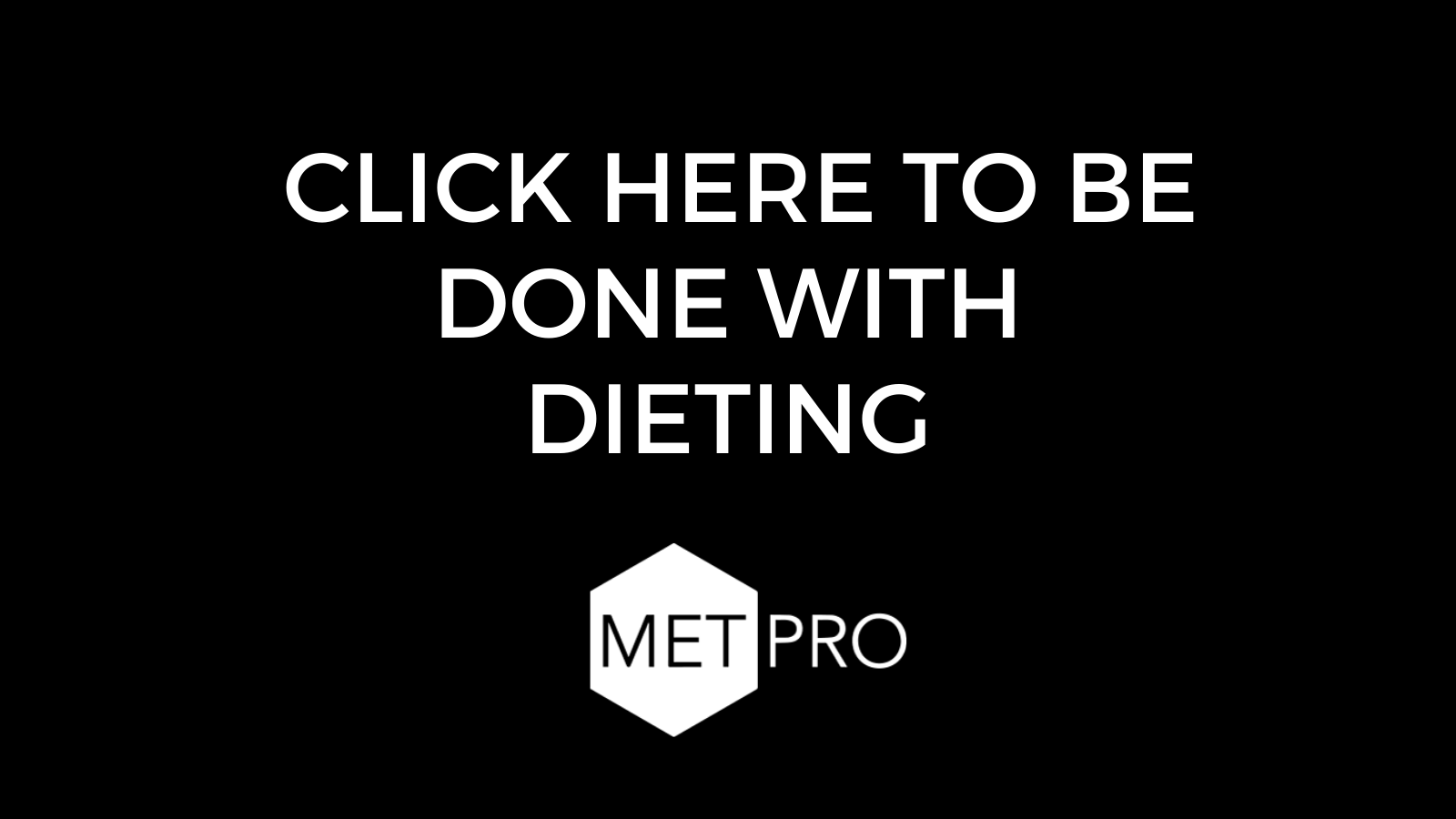I have, joining me, the Founder of MetPro, Angelo Poli. We are going to be discussing extreme diets and potentially the myths surrounding them, if there are any. I have questions because I've heard of many diets throughout my lifetime. I feel like I've tried a great number of them. When it comes to things a fourteen-day cleanse, those juice diets or something like that, I have always been told that those help you lose weight fast. Is that accurate?
What I'm going to tell you is going to surprise you. Yes, but it's not going to do what you think it's going to do. There are all of these crash, liquid or get-weight-off-quick approaches, which nobody ever says that’s what they are doing. They always say, “I feel like I need to cleanse my body.” What they are usually coming to me asking is, “Can I drink liquids for seven days and lose a bunch of weight?” The answer is yes. You can do that, and you will lose weight.
If you don't put liquids into your body, then there's going to be less intestinal bulk. You are going to consume fewer calories. You are going to consume fewer carbohydrates, likely, and your body is going to respond with weight loss. The problem is that in no way is it going to contribute towards the bigger-picture focus. There's no mystery when it comes to weight loss. We have discovered, and it is scientifically proven, the most effective means of weight loss. Here's the diet. Water is the most effective.
Will drinking water make me lose weight?
In fact, it is scientifically proven that any ingredients added to the water slow down weight loss. We also call that starvation. That's the problem.
That's negative.
We know what happens when you stop eating. You are going to lose weight. The bigger question is, “How is your metabolism going to respond to it?” This is why everyone knows that approach ends up being very temporary. There are some medical circumstances, etc. that call for an approach like that. There is nothing wrong with that in those cases.
For the person that comes to me and says, “Here are my long-term goals,” any 10-day or 14-day juice diet is not even going to be on the radar for me. What matters to me is losing weight while you are eating. I know you can lose weight if you are not eating but that's not the point. I had this conversation. I had someone say, “I reached XYZ weight on the scale.” I said, “You didn't.” “What do you mean I didn't? I saw it. That was what the scale said” I said, “No.”
Here's the reality. You don't own that number unless you hit that number because your metabolism wants you to be there. It's running fast enough to where you are eating and hitting that number. If you are eating a reasonably sustainable intake and you are seeing that number on the scale, it's yours. If you have been doing a liquid diet or a juice fast, likely, you will see a dip on the scale but it will be extremely temporary. That's where understanding how those are impacting our physiology is critical.
To recap, it's not enough to hit the number on the scale. It's how you hit the number. It's like if you get sick. You have some kind of flu and don't eat anything for three days. You got to that weight but it is going to come back on as soon as you start eating again.
The research is very clear. When we look at meta-analysis, they did a study with thousands of clinical research trials. What they did was they isolated the ones that were most effective. Almost 90% of them included some form of vigorous exercise or exercise that's vigorous for that person. Some people’s vigorous exercise is simply going on a walk.
A liquid diet, especially a sustained one, is not going to, in any way, parlay into the type of lifestyle that is clinically proven to show long-term sustainable results and weight loss. That doesn't mean that it's the end of the world if you tried something like that or if you've done something like that in the past. If you have noticed that after participating in some extreme diet, whether it's a liquid diet or an ultra-restrictive diet where you’ve eliminated not just some carbs but all carbs or, in some way, have gone on an extreme restriction.
You are noticing that your metabolism seems to be a little bit more stubborn. You are not alone. That's the adaptation that takes place. What happens is that studies have shown that within three days, your body will start acclimating to changes in your nutrition and environment. You may end up creating some short-term weight loss but longer-term slowed metabolic pacing if you don’t know how to bring yourself back out of that. That's a big idea.
Is that the same across the board? What if you are doing a crash diet or a yo-yo diet? Is that similar? If so, does that indicate that there are some dangers associated with it?
That's going to affect some people more than others. We always say it depends. The difference is that it tends to be accidentally backed into. Here's how people end up yo-yo dieting. They get into a good routine of clean eating or solid nutrition and then have a bad night or weekend. It starts innocently, “I overate last night. I don't need breakfast.”
It starts innocently going, “With what I ate or drank last night, I don't need to eat anything this morning.” We tend to start skipping meals or start falling back into our habits. What you will find is that if you are not eating the right things, you can make up for it by not eating as often or as much. While that might help you cling to the number that you are at, it's an assault on your metabolism. It always ends up resulting in you eating fewer total calories and simply maintaining your weight, if not increasing it a little.
You experience what's called adaptive thermogenesis. Your body has an adaptation response. You are used to eating a lower total caloric intake. Your body is burning less hours out of the day, and you end up in this yo-yo cycle of dieting where even eating very little doesn't seem to be doing enough. That's where the crash diets enter. That’s like, “I'm already eating clean and not seeing what I want. Therefore, I'm going to try this starvation plan for three days.” Your metabolism tanks. You end up undermining a lot of your hard work.
Here's what you have to be careful of. I said it affects some people more than others. I will give you a classic example. Here's who it doesn't necessarily affect. I'm going to use a guy as an example. You have a guy that has poor eating habits. He wakes up and has a cup of coffee and a donut for breakfast. He hits the drive-through for lunch and is not eating healthy at dinner. We know that type. Any amount of time that he can improve and restrict those habits is going to benefit him. There's virtually no downside.
Compare that to the person who has been eating clean or yo-yo dieting, whether intentionally or not, for years. I can share with you stories of many hardworking women that I've worked with that fall into this category. Here they are already watching what they eat. They notice that because of X, Y or Z, their weight has crept up a little bit, so they go on a more extreme restriction plan to take 10 pounds off. What inevitably happens? Do they keep it off?
No.
It comes back. We all know it. We joke about it. The thing is, in our minds, we say, “Nothing gained, nothing lost,” but that's not so. It can be especially negative for women, and here's why. When that gal lost 10 pounds, she didn't just lose 10 pounds of fat. That's not the way physiology works. When she crashed dieted, whether it was for 1 week, 10 days or 21 days, she lost 10 pounds. She probably lost 6 or maybe 7 pounds of fat but she lost 3 or 4 pounds of muscle along with it. That's the way it works. When she hits rock bottom, this is no longer sustainable. She simply gained that 10 pounds back. Nothing gained, nothing lost? Not necessarily. What did she gain back?
She gained back all fat, no muscle. That's sad. She did all that hard work.
There are things you can do to avoid that but most people aren't thinking about those things at the moment. For the average person, that's what happened. This female lost 6 or 7 pounds of fat, 3 or 4 pounds of muscle, and gained back 10 pounds of fat. She has a slightly higher body fat percentage and a slightly lower resting metabolic rate, that's not necessarily because of that 3-pound muscle delta. That contributes in a small way but it's because her body had to adapt to that lower intake.
She has done that 5 or 6 times over the course of the last few years, which she gained and lost that same 10 pounds. That's where I hear a lot of women saying, “I'm noticing I'm carrying my weight differently.” That can happen for hormonal reasons at a certain age in life but a lot of times, we experience that as a result of that yo-yo dieting scenario. This affects men as well. The same scenario will happen to men. They tend to have, from a hormonal standpoint, more testosterone, so they have a little leg up when it comes to regaining that muscle or holding onto muscle. It can affect both genders.
Those are the little underlying insidious hidden ills when it comes to crash dieting that isn't necessarily on the label of that get quick, get thin or quick shake that you take. It's always veiled in this healthy weight loss because this is a healthy method of doing this. What they are not telling you is that your metabolism is going to acclimate to that. How do you avoid that?
The truth is you can't lose weight unless there is some mechanic creating a deficit. If you are not strategic with that deficit, that's why it seems to get harder over time. There is a way to undo that, not without resources. We can have a strategy to take the weight off, take strategic pauses in that weight loss, and make sure your metabolism is running smooth and strong through the whole process.
That's where your MetPro concierge coach can help.
I hope so. That is the idea. We would enjoy doing so.
Is there anything else that people should be on the lookout for when it comes to these extreme diets that we didn't already cover?
If you take ten people, line them up and say, “What's going to trigger weight loss for each of these ten people?” and they are the same gender, age, rough body type, and activity level, it’s going to be different for all ten of them. No two people are going to be identical. This isn't the fitness industry. This tends to be more in the diet industry. What some programs will do is they will throw everything plus the kitchen sink at it. They will be so aggressive that they are certain, “This triggers weight loss for everyone.” There were only 2% that needed something that extreme.
The other 98% would have started losing weight keeping their metabolism intact and not suffering that ill adaptation response that happens. That's the one thing you can count on. Your body adapts to your environment. Be wary of programs that say, “This is the only way to lose weight or this is what you have to do,” and they have the diet already in hand before knowing you and your needs. Every single person is different. We each have unique needs.
That's the truth. I know you've said this before. You have two people exactly the same, and they lose it completely differently. It's fascinating to watch. I appreciate your time. Thank you so much for discussing extreme diets with me. For the audience, that is all for this episode. I want to make sure that you are getting all of your MetPro episodes. Go to MetPro.co/podcast to get the rest of our show. If you want to learn more about MetPro, you can go to MetPro.co. I will be back next time. Until then, remember that consistency is key.






